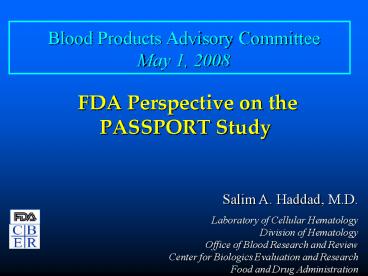FDA Perspective on the PASSPORT Study - PowerPoint PPT Presentation
1 / 12
Title:
FDA Perspective on the PASSPORT Study
Description:
FDA Perspective on the PASSPORT Study. Salim A. Haddad, M.D. Laboratory of Cellular Hematology. Division of Hematology. Office of Blood Research and Review – PowerPoint PPT presentation
Number of Views:196
Avg rating:3.0/5.0
Title: FDA Perspective on the PASSPORT Study
1
FDA Perspective on the PASSPORT Study
Blood Products Advisory Committee May 1, 2008
Salim A. Haddad, M.D. Laboratory of Cellular
Hematology Division of Hematology Office of
Blood Research and Review Center for Biologics
Evaluation and Research Food and Drug
Administration
2
Background
- FDA engagement in efforts to improve platelet
storage - ? BPAC Pre-storage pooling, seven-day
platelets, bacterial contamination - of platelets, rapid tests for detection
of bacterial contamination - ? Workshop on methods for reducing
pathogens in cellular blood - products
- The purpose of the PASSPORT study was to address
the issue of bacterial contamination of platelets
stored for 7 days - Prior to the initiation of the PASSPORT study,
FDA conducted extensive dialogue with the blood
community - Discussions included FDA participation on the
AABB Task Force on Bacterial Contamination
3
PASSPORT Study
- March 2005 Gambro clearance for 7-day platelets
when the platelets were tested with BacT/ALERT
early in storage - Phase IV PASSPORT post marketing study
- Objective of PASSPORT to confirm that 7-day
platelets, when tested early in storage with
BacT/ALERT, presented no greater risk for
bacterial contamination than untested 5-day
platelets - Fenwal co-sponsor in Nov 2005
4
PASSPORT Study Design
Days of storage
D7
D5
D4
D3
D2
D1
D6
Discard
Sample for culture using BacT/ALERT
2nd Sample for BacT/ALERT testing
-
Transfuse
- Primary hypothesis UCL residual bacterial
contamination rate of 7-day platelets was no
greater than 1/5,000 with 95 confidence - Study sample size 50,000 outdated units
- Success detection of lt 5 positive units at day
7
5
PASSPORT Interim Results
Days of storage
D7
D5
D4
D3
D2
D1
D6
Discard
Sample for culture using BacT/ALERT
2nd Sample for BacT/ALERT testing
Transfuse
January 2008 Sponsors raise safety concerns
? Day 1 193, 078 collections tested with 48
true positives ? True positive rate at
day 1 1/5,000 ? Day 7 2 true positives
out of 2, 571 platelet units tested ?
Platelet transfusion recipients Out of 5
reported reactions, 3 septic reactions
(STR) confirmed to be resulting from transfusion
of a contaminated platelet product ?
septic transfusion rate of 1/64,000
collections
6
Comparison of Septic Transfusion Reactions
- PASSPORT study septic reaction rate 1/64,000
compared to American Red Cross septic reaction
rate 1/120,000 - No statistically significant difference (Fisher
Exact Test)
Transfusion July 2007 vol 47 1134-1142
Updates at ABCs Platelet Conference, Nov
2007 and HHS Advisory Committee
on Blood Safety and
Availability, January 2008
7
Conclusions from the PASSPORT Interim Analysis
- STR comparison, while showing no conclusive
evidence that PASSPORT rates were higher than
those of ARC study, did raise safety concerns - Results of testing after day 7 (2 positive
results out of 2,571 units tested) suggested that
the likelihood of a successful outcome was low
(success lt 5 positives out of 50,000)
8
Assessment of the PASSPORT Study
- Divergence of opinion among the sponsors
immediate suspension vs. introduction of
additional safeguards - No stopping rules were established in the
protocol, the high contamination and septic
transfusion rates were not foreseen - Transfusion sepsis risk at days 6 and 7 not fully
assessed, the study did not include reporting of
the proportion of platelets transfused after day
5 - Cessation of the PASSPORT study return to 5-day
storage with potential for platelet shortage
9
Phase-out of the PASSPORT Study
- Balancing concerns for platelet safety and
availability, FDA opted for a phase-out period to
allow the participating centers to adjust to a
reversion to 5 day platelets
10
Impact on Safety, Availability, and TRALI
Mitigation
- Impact
- ? Availability of platelets
- ? TRALI mitigation strategies
- Concern of blood establishments over meeting
cGMPs - Americas Blood Centers survey need for a 19
increase in platelet production - AABB risk assessment on overall platelet safety
11
Extension of Phase-out Period
- Request for an extension of the phase out period
from 28 to 90 days - FDA did not object to the extension as a prudent
measure to enable users of the Gambro and Fenwal
apheresis devices to revert back to 5 days in an
effort to avert platelet shortages and minimize
other potential risks of this transition
12
Next Steps
- FDA will continue to monitor and evaluate the
data generated as PASSPORT is phased out - FDA will work with sponsors and the AABB to
redesign the study with additional safeguards to
reduce the septic and contamination rates of 7
day platelets































